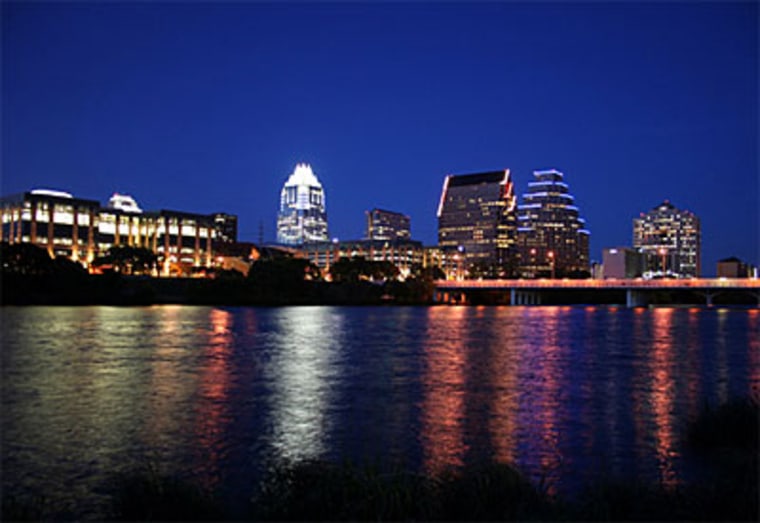We've all heard about the wonders of the broadband Web. You can stream video, surf at lightning speeds, search for God-knows-what, get your e-mail in a blink. Here's what you may not know: It can let you live far richer than you probably live now.
Let me explain: For most of us, our biggest expense is the monthly mortgage payment that buys our house. The median house in America costs $210,000. Let's put in a new kitchen, redo the bathrooms and place the house in a good school district. Bingo, $300,000. For this money, you'll get a 2,300-square-foot house on a quarter-acre.
Does $300,000 sound cheap or expensive to you? Depends entirely on where you live, right? You'd say ridiculously cheap if you happen to live in Boston, New York, Washington, the Florida coasts or anywhere in California.
What if you want to live in a grander fashion? Say a 4,000-square-foot house on an acre.
What would that cost you? In Palo Alto, Calif., Greenwich, Conn., Washington, D.C.'s Georgetown or San Diego's La Jolla, easily $4 million. In just as lovely Bend, Ore., where the sky is blue and dry, the Deschutes River trout jump year round and Mt. Bachelor winter powder is bitchin’, maybe $700,000. You'll get more than an acre, too.
So 20th century
So why haven't we all moved to Bend? Most of us, I contend, are trapped in old thinking, victims of pre-broadband Web stereotypes. Yes (one's thinking goes) I could "drop out of the rat race" and move to Bend. But the upgrade in lifestyle would cost me in other ways. Limited by the Bend salary rates, I would gain little financially. I might indeed drop my cost of living, but my paycheck would shrink, too. My chance for stimulating work could shrivel, as I find myself out of the professional loop. Worst of all, I’d feel isolated...even bored!
Ah, bunk! This is the 21st century, man! Today you can enjoy the best of both worlds:
1. Live where you want.
2. Get paid like you're in a big city
3. Never be isolated or bored.
Say you're a bright knowledge worker and have spent a decade or more in your industry, sharpening your skills, making the right contacts. You earn a decent salary on the metro coast, but those dollars just don't stretch like they used to. So you decide to shake off the costly coastal infrastructure and relocate to a cheaper rural region. But you maintain your ties to the larger metro area and pull down the same amount of money as you did when you were living in Profligate Corners. In other words, you still harvest your dollars from Silicon Valley, Washington and New York, but now you spend and invest them in Bend or Boise.
Congratulations! You are a true 21st century man or woman! You are a Geographic Arbitrageur! Thanks to computers, Fed-Ex, cell phones, but mostly the broadband Web, you can do this.
The secrets of the GeoArb
Not everyone is cut out to be a Geographic Arbitrageur, of course. It takes buckets of moxie and self-motivation to work hours (or even time zones) away from the big-dollar centers. It takes a certain knowledge and sophistication about how the big-dollar centers operate.
I have seen some professionals play the GeoArb game without ever having lived in the economic powerhouses, but it's rare. It helps enormously to have lived on the metro coasts, put in a few years, met people in your field face-to-face and established a professional reputation and a contact list.
In this century of high metro real estate prices and flattening paychecks, GeoArb could become a way of life for millions of knowledge workers. Suppose you lost your high-paying white-collar job in a big city. What would you do? File for unemployment? Probably not. Show up a bogus "jobs retraining" program and be taught by a social worker who knows little about the way business really works? No. In all likelihood you'd set up a home office and try your hand as a consultant. That's what some 300,000 Americans have done since 2000.
Here's the catch. Surviving as a freelance knowledge worker — where you sell your time — is extremely tough in high-priced joints like New York, California or Washington, especially if you are the sole family breadwinner. It is cruelly difficult to generate enough income to make your $4,000 per month mortgage payments, keep the cars and professional wardrobes up, take clients to dinner, maybe send the kids to private schools and try to save money.
Most competent freelancers past the age of 30 with big-city connections in fields such as product design, public relations, software and sales and marketing can make $100,000 per year if they put their minds to it. Trust me, it's not that hard to do if you're a pro and you're pulling those bucks from California or New York. What's hard for any freelancer to do anywhere on the planet is earn the second $100,000. Yet that second $100,000 is what your household needs to swing a comfortable middle-class family lifestyle in the metro coastal areas.
But $100,000 per year, or even $75,000, buys a nice life in smaller communities. Presto: Geographic Arbitrage.
Go for it.
